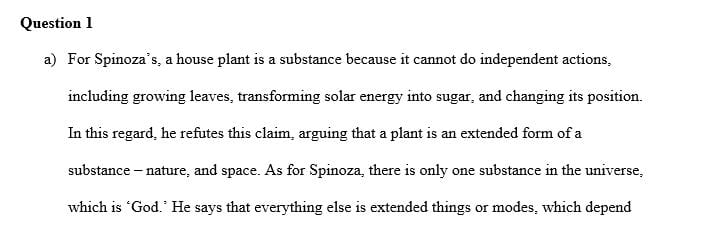Explain as clearly as you can how a house plant relates to the Extended substance.
1. Substance vs. Mode
Suppose that I claim that a house plant is a substance because it is capable of independent action: it can grow leaves, transform solar energy into sugar, and even change its position.
Spinoza would deny that the house plant is a substance.
a) Explain as clearly as you can how a house plant relates to the Extended substance.
b) How do we determine that something is a substance?
c) Why is Extension a substance, but the house plant is not?
d) Why does Spinoza’s metaphysical system need the notion of a substance? Why could he not merely claim that there are just things (like house plants, dust particles, stones, galaxies) and that Nature is merely a collective that contains those things?
2. Perceptual and Imaginary Notions vs. True Ideas
a) Explain in your own words (with examples) the concept of a true idea given by Spinoza in the following:
“a true idea is simple, or composed of simple ideas; that it shows how and why something is, or has been done; and that its objective effects proceed in the soul according to the formal nature of its object. This is the same as what the ancients said, i.e., that true knowledge proceeds from cause to effect.” ([85] in the Treatise on the Emendation of the Intellect)
b) Suppose that you have an image of a red triangle in your consciousness. Why is that not a true idea of what a triangle is? c) Is there any way in which we could correct that idea of a triangle into a true idea of a triangle?
d) Spinoza thinks that ideas of good and evil, perfection and imperfection are not true ideas of anything outside the mind. (Appendix to Part I of the Ethics) What does he mean by that?
e) How do you think one can (if at all) arrive at a true idea of good and evil per Spinoza’s criterion in Section (a) above?
3. Spinoza’s View of God
What I call the Traditional Model of God has three main factors:
1) There is an intelligent agent outside and prior to Nature’s existence
2) This intelligent agent had prior ideas of what the natures of possible beings are
3) This intelligent agent is benevolent in the sense that he created this actual order of things and causes in Nature because it was good
a) Explain in your own words how the above factors 1 to 3 amount to an explanation of the actual order and existence of Nature.
b) Explain 2 ways in which Spinoza’s view of God offers, in your reasoned view, a more intelligible (better) explanation of Nature than the traditional model.
Answer preview to explain as clearly as you can how a house plant relates to the Extended substance.

1952 words


